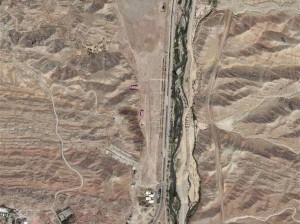 Iran’s Foreign Ministry said it will consider allowing International Atomic Energy Agency officials to inspect a military site suspected of housing nuclear work once the country’s right to enrich uranium is recognized by Western powers.
Iran’s Foreign Ministry said it will consider allowing International Atomic Energy Agency officials to inspect a military site suspected of housing nuclear work once the country’s right to enrich uranium is recognized by Western powers.
“If we reach an agreement where Iran’s nuclear rights are fully recognized, meaning the right to possess nuclear science and the full nuclear cycle toward peaceful goals, Iran will be ready to take necessary measures to allay concerns expressed by the IAEA,” Iranian Foreign Ministry spokesman Ramin Mehmanparast told reporters in Tehran today. He was responding to a question about whether the agency would be given access to the Parchin military complex and whether Iran would impose any conditions for the visit.
Today’s announcement casts doubt on whether a scheduled Jan. 16 visit by IAEA inspectors will result in an agreement to broaden inspections, as predicted by the agency last month. The IAEA sees a visit to Parchin, about 30 kilometers (19 miles) southeast of Tehran, as being its top goal in Iran. It says it was given information showing Iran may have built a blast chamber there for testing nuclear-weapons components.
The U.S. and its allies say Iran may be trying to make a nuclear bomb, and have tightened trade and financial sanctions. The U.S. and Israel have also threatened military strikes to halt Iran’s nuclear program. Iran says the program is solely civilian and needed to secure energy for a growing population.
While IAEA officials routinely inspect Iran’s declared nuclear facilities, such as enrichment plants at Natanz and Fordo, existing treaty arrangements don’t compel the country to open up peripheral facilities such as Parchin.
Not Shared
Mehmanparast reiterated Iran’s argument that the evidence given to the IAEA by unnamed countries isn’t genuine, underlining that Iranian authorities, despite their requests, haven’t been given access to the documents. “Throughout the years the agency has never been able to share this intelligence with us and it hasn’t been authenticated,” he said.
Mehmanparast didn’t say what progress has been made on agreeing a time and place for the next round of high-level talks between Iran and the so-called P5+1 group, made up of the U.S., U.K., Russia, China, France and Germany. They will meet “very soon,” the EU said last week. The last round of negotiations were in Moscow in June.
By Bloomberg
The Iran Project is not responsible for the content of quoted articles.

 QR code
QR code